University Assignment: Core Principles and Theories of Care
VerifiedAdded on 2022/08/16
|10
|1114
|17
Report
AI Summary
This report delves into the core principles and theories of care, crucial for healthcare and social work professionals. It outlines seven key principles, emphasizing patient-centered planning, effective communication, and end-of-life care collaboration. The report also examines various theoretical frameworks, including transpersonal, systems, social learning, and cognitive learning theories, and their application in care settings. Furthermore, it analyzes the impact of social processes such as family, community, employment, peer groups, housing, and education on service users, highlighting how these factors influence healthcare access and outcomes. The conclusion reinforces the importance of adhering to core principles to achieve positive patient outcomes and underscores the role of these theoretical frameworks in improving patient care.
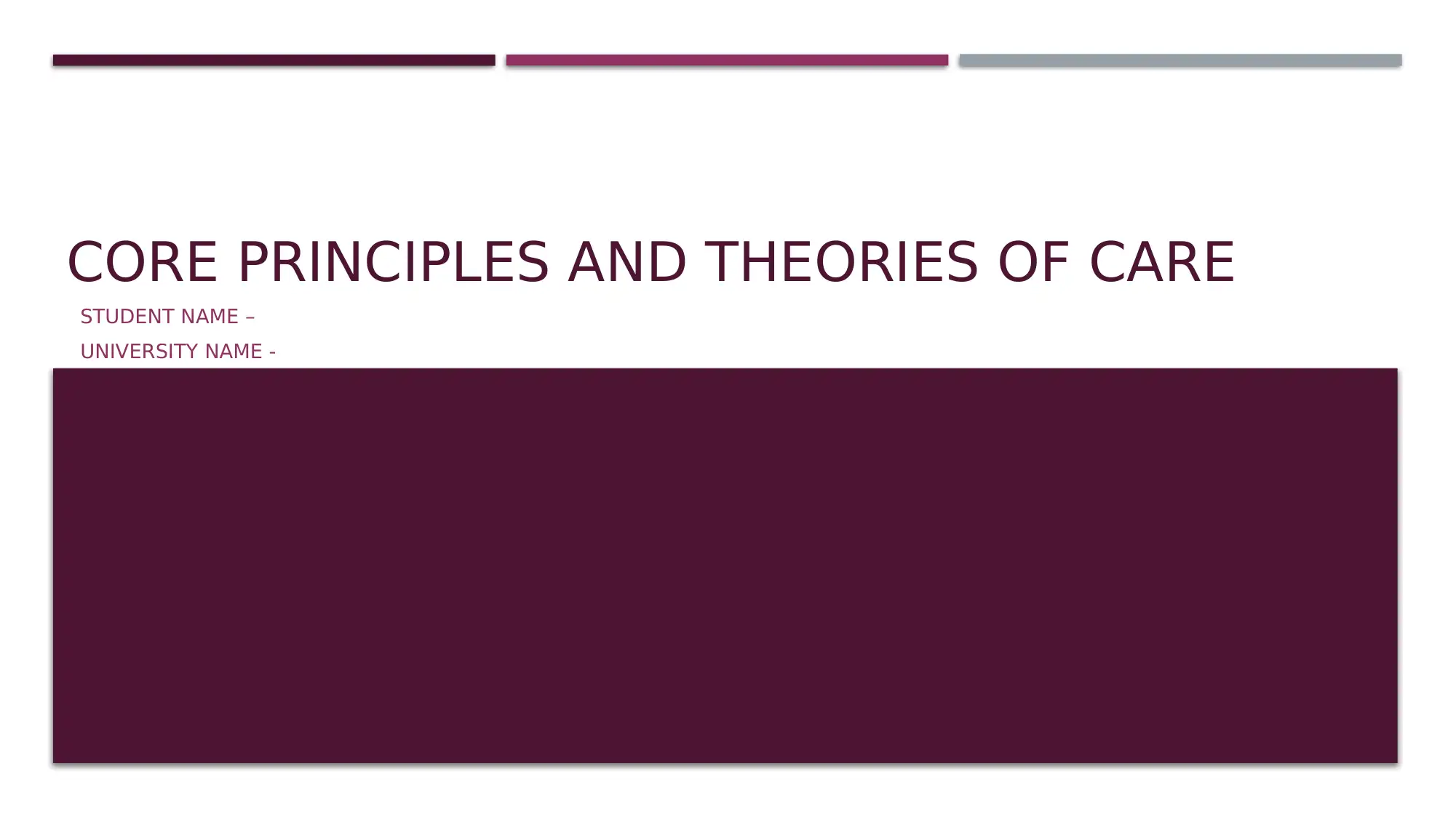
CORE PRINCIPLES AND THEORIES OF CARE
STUDENT NAME –
UNIVERSITY NAME -
STUDENT NAME –
UNIVERSITY NAME -
Paraphrase This Document
Need a fresh take? Get an instant paraphrase of this document with our AI Paraphraser

CORE PRINCIPLES OF CARE Principle 1 – The care and support for the individuals is delivered by
planning by prioritizing their needs while guiding all their actions
and decisions.
Principle 2 – The communication is done in a straightforward and
timely manner by considering the spiritual and cultural needs and
circumstance of the individual1.
Principle 3 – End-of-life care is provided to the patient with carefully
collaborating with other medical professionals for generating a
positive health outcome.
Principle 4 – It is the responsibility of the carer to be aware of the
range of options available and the potential benefits and harms that
are likely for the patients.
________________________________________________________________
planning by prioritizing their needs while guiding all their actions
and decisions.
Principle 2 – The communication is done in a straightforward and
timely manner by considering the spiritual and cultural needs and
circumstance of the individual1.
Principle 3 – End-of-life care is provided to the patient with carefully
collaborating with other medical professionals for generating a
positive health outcome.
Principle 4 – It is the responsibility of the carer to be aware of the
range of options available and the potential benefits and harms that
are likely for the patients.
________________________________________________________________
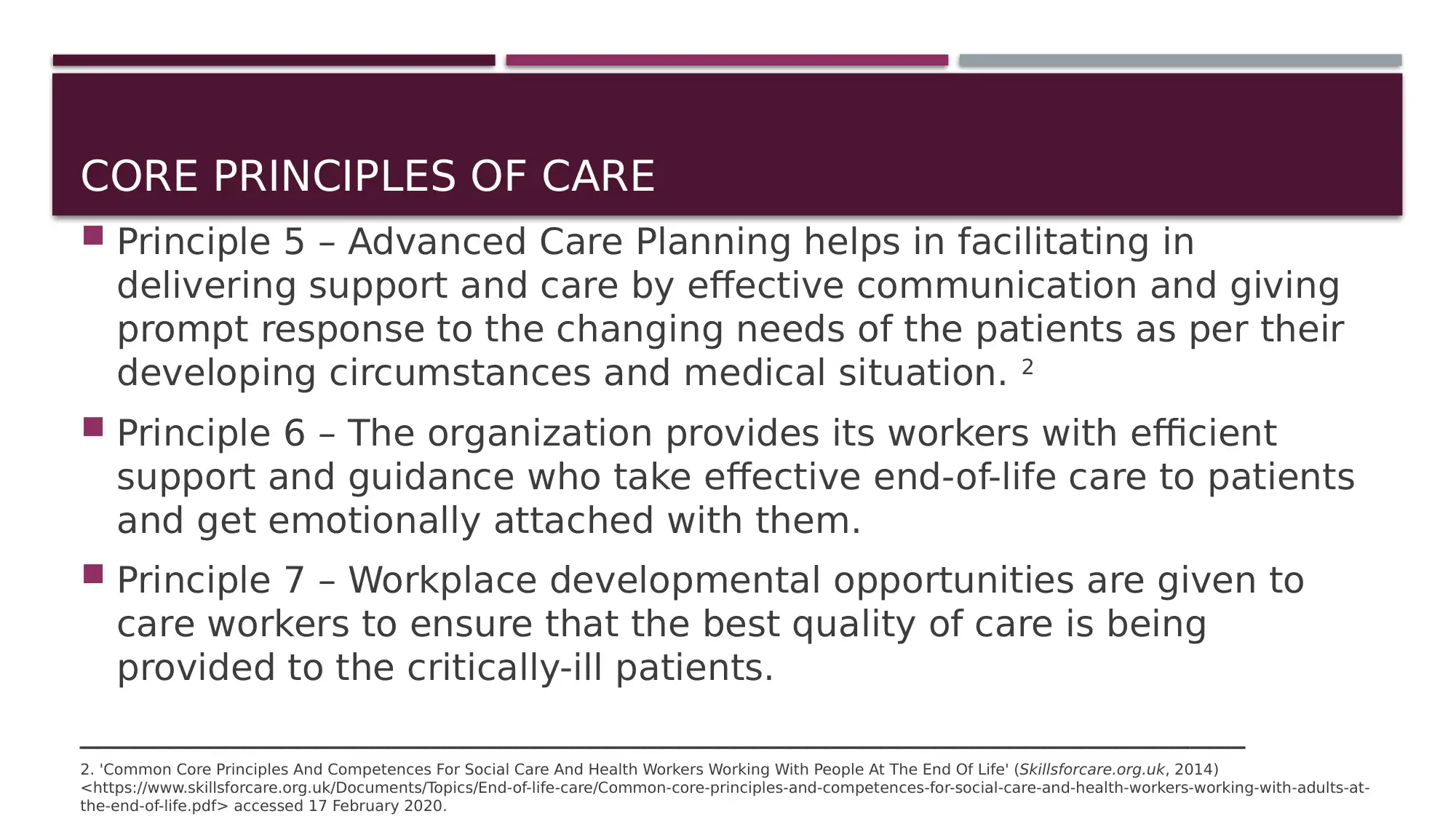
CORE PRINCIPLES OF CARE
Principle 5 – Advanced Care Planning helps in facilitating in
delivering support and care by effective communication and giving
prompt response to the changing needs of the patients as per their
developing circumstances and medical situation. 2
Principle 6 – The organization provides its workers with efficient
support and guidance who take effective end-of-life care to patients
and get emotionally attached with them.
Principle 7 – Workplace developmental opportunities are given to
care workers to ensure that the best quality of care is being
provided to the critically-ill patients.
________________________________________________________________
2. 'Common Core Principles And Competences For Social Care And Health Workers Working With People At The End Of Life' (Skillsforcare.org.uk, 2014)
<https://www.skillsforcare.org.uk/Documents/Topics/End-of-life-care/Common-core-principles-and-competences-for-social-care-and-health-workers-working-with-adults-at-
the-end-of-life.pdf> accessed 17 February 2020.
Principle 5 – Advanced Care Planning helps in facilitating in
delivering support and care by effective communication and giving
prompt response to the changing needs of the patients as per their
developing circumstances and medical situation. 2
Principle 6 – The organization provides its workers with efficient
support and guidance who take effective end-of-life care to patients
and get emotionally attached with them.
Principle 7 – Workplace developmental opportunities are given to
care workers to ensure that the best quality of care is being
provided to the critically-ill patients.
________________________________________________________________
2. 'Common Core Principles And Competences For Social Care And Health Workers Working With People At The End Of Life' (Skillsforcare.org.uk, 2014)
<https://www.skillsforcare.org.uk/Documents/Topics/End-of-life-care/Common-core-principles-and-competences-for-social-care-and-health-workers-working-with-adults-at-
the-end-of-life.pdf> accessed 17 February 2020.
⊘ This is a preview!⊘
Do you want full access?
Subscribe today to unlock all pages.

Trusted by 1+ million students worldwide
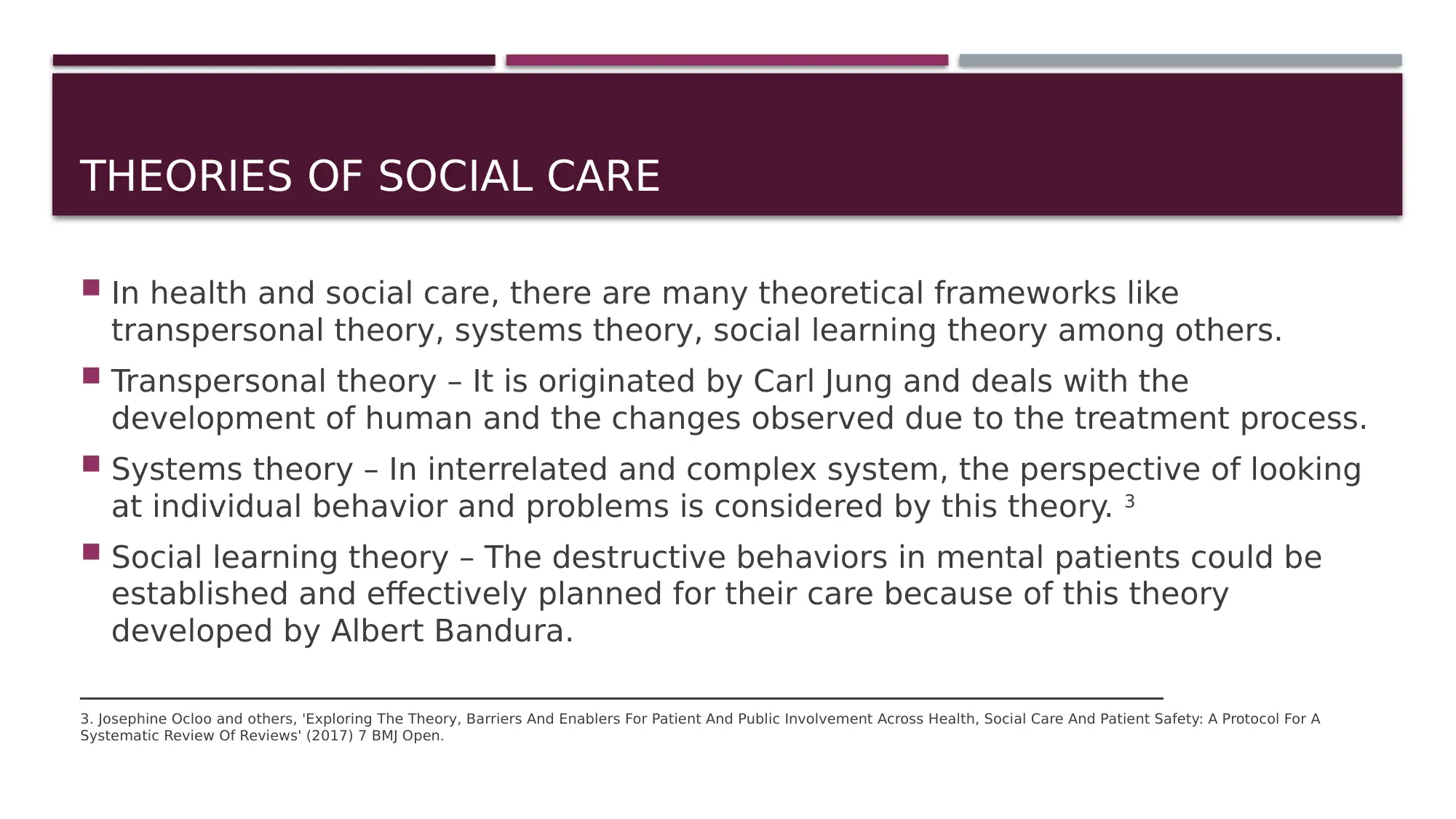
THEORIES OF SOCIAL CARE
In health and social care, there are many theoretical frameworks like
transpersonal theory, systems theory, social learning theory among others.
Transpersonal theory – It is originated by Carl Jung and deals with the
development of human and the changes observed due to the treatment process.
Systems theory – In interrelated and complex system, the perspective of looking
at individual behavior and problems is considered by this theory. 3
Social learning theory – The destructive behaviors in mental patients could be
established and effectively planned for their care because of this theory
developed by Albert Bandura.
______________________________________________________________________
3. Josephine Ocloo and others, 'Exploring The Theory, Barriers And Enablers For Patient And Public Involvement Across Health, Social Care And Patient Safety: A Protocol For A
Systematic Review Of Reviews' (2017) 7 BMJ Open.
In health and social care, there are many theoretical frameworks like
transpersonal theory, systems theory, social learning theory among others.
Transpersonal theory – It is originated by Carl Jung and deals with the
development of human and the changes observed due to the treatment process.
Systems theory – In interrelated and complex system, the perspective of looking
at individual behavior and problems is considered by this theory. 3
Social learning theory – The destructive behaviors in mental patients could be
established and effectively planned for their care because of this theory
developed by Albert Bandura.
______________________________________________________________________
3. Josephine Ocloo and others, 'Exploring The Theory, Barriers And Enablers For Patient And Public Involvement Across Health, Social Care And Patient Safety: A Protocol For A
Systematic Review Of Reviews' (2017) 7 BMJ Open.
Paraphrase This Document
Need a fresh take? Get an instant paraphrase of this document with our AI Paraphraser

THEORIES OF SOCIAL CARE
Cognitive learning theory – It is with the help of this theory
that the carers are able to establish the facts by careful
interpretation and gaining new perspectives for the health
betterment of the individual 4. It is the responsibility of the
care givers to analyze the situation of the patient before
and acknowledge their specific needs from the treatment.
_______________________________________________________
4. Joyce M. Wang and Joseph A. Zorek, 'Deliberate Practice As A Theoretical Framework For Interprofessional Experiential Education' (2016) 7 Frontiers in Pharmacology.
Cognitive learning theory – It is with the help of this theory
that the carers are able to establish the facts by careful
interpretation and gaining new perspectives for the health
betterment of the individual 4. It is the responsibility of the
care givers to analyze the situation of the patient before
and acknowledge their specific needs from the treatment.
_______________________________________________________
4. Joyce M. Wang and Joseph A. Zorek, 'Deliberate Practice As A Theoretical Framework For Interprofessional Experiential Education' (2016) 7 Frontiers in Pharmacology.
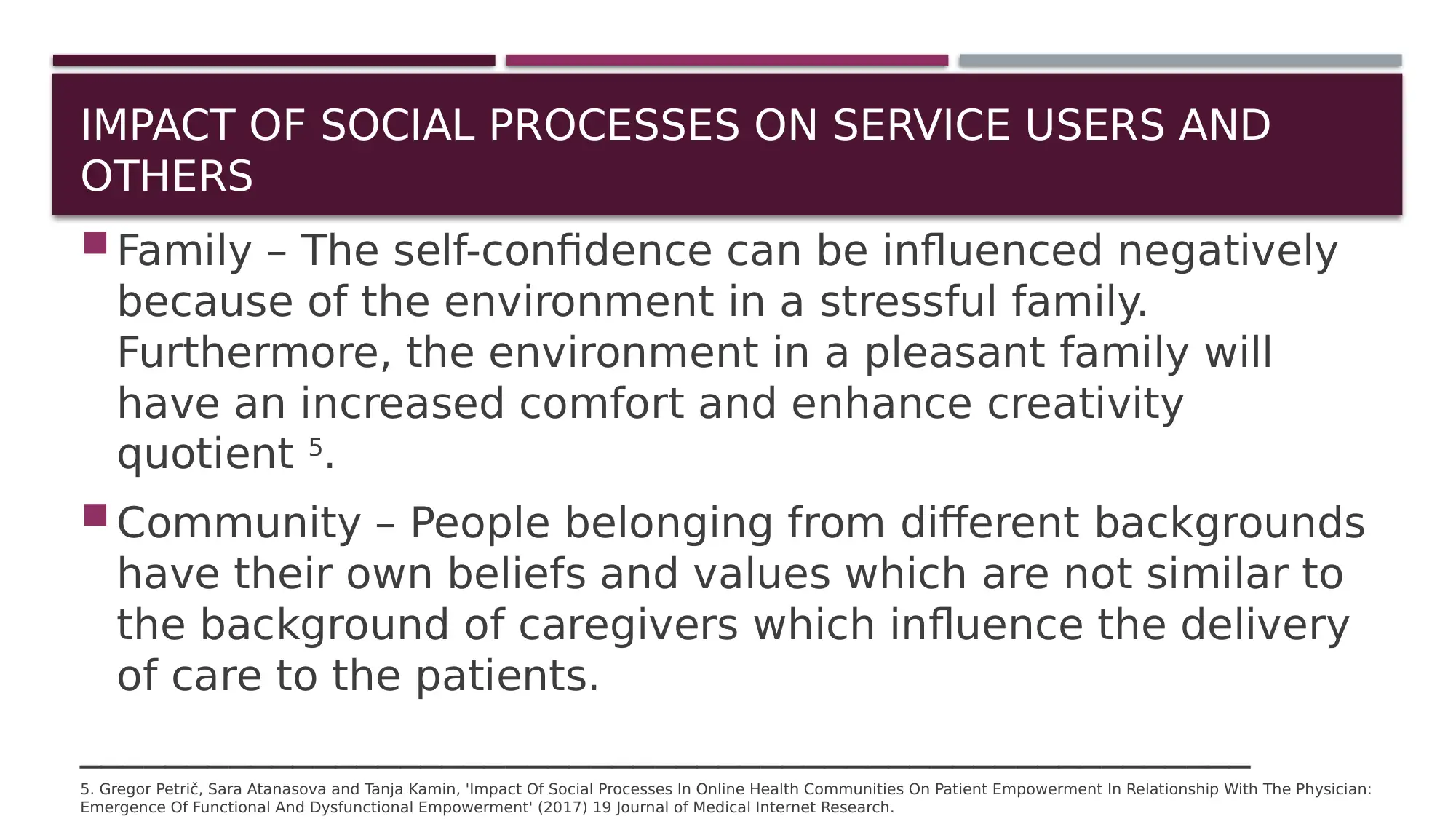
IMPACT OF SOCIAL PROCESSES ON SERVICE USERS AND
OTHERS
Family – The self-confidence can be influenced negatively
because of the environment in a stressful family.
Furthermore, the environment in a pleasant family will
have an increased comfort and enhance creativity
quotient 5.
Community – People belonging from different backgrounds
have their own beliefs and values which are not similar to
the background of caregivers which influence the delivery
of care to the patients.
_______________________________________________________
5. Gregor Petrič, Sara Atanasova and Tanja Kamin, 'Impact Of Social Processes In Online Health Communities On Patient Empowerment In Relationship With The Physician:
Emergence Of Functional And Dysfunctional Empowerment' (2017) 19 Journal of Medical Internet Research.
OTHERS
Family – The self-confidence can be influenced negatively
because of the environment in a stressful family.
Furthermore, the environment in a pleasant family will
have an increased comfort and enhance creativity
quotient 5.
Community – People belonging from different backgrounds
have their own beliefs and values which are not similar to
the background of caregivers which influence the delivery
of care to the patients.
_______________________________________________________
5. Gregor Petrič, Sara Atanasova and Tanja Kamin, 'Impact Of Social Processes In Online Health Communities On Patient Empowerment In Relationship With The Physician:
Emergence Of Functional And Dysfunctional Empowerment' (2017) 19 Journal of Medical Internet Research.
⊘ This is a preview!⊘
Do you want full access?
Subscribe today to unlock all pages.

Trusted by 1+ million students worldwide

IMPACT OF SOCIAL PROCESSES ON SERVICE USERS AND
OTHERS
Employment – There is a possibility when there is no
employment of an individual or any family member, there
is an increased chance of experiencing lower access to
healthcare and social services which, in turn, can influence
the mental stability of the individual. 6
Peer groups – The behaviors displayed by the peers like
smoking which could have detrimental effects on the
health of the patient. The values, beliefs and attitude is
affected by the changes in the peer group of the
individual.
_______________________________________________________
OTHERS
Employment – There is a possibility when there is no
employment of an individual or any family member, there
is an increased chance of experiencing lower access to
healthcare and social services which, in turn, can influence
the mental stability of the individual. 6
Peer groups – The behaviors displayed by the peers like
smoking which could have detrimental effects on the
health of the patient. The values, beliefs and attitude is
affected by the changes in the peer group of the
individual.
_______________________________________________________
Paraphrase This Document
Need a fresh take? Get an instant paraphrase of this document with our AI Paraphraser
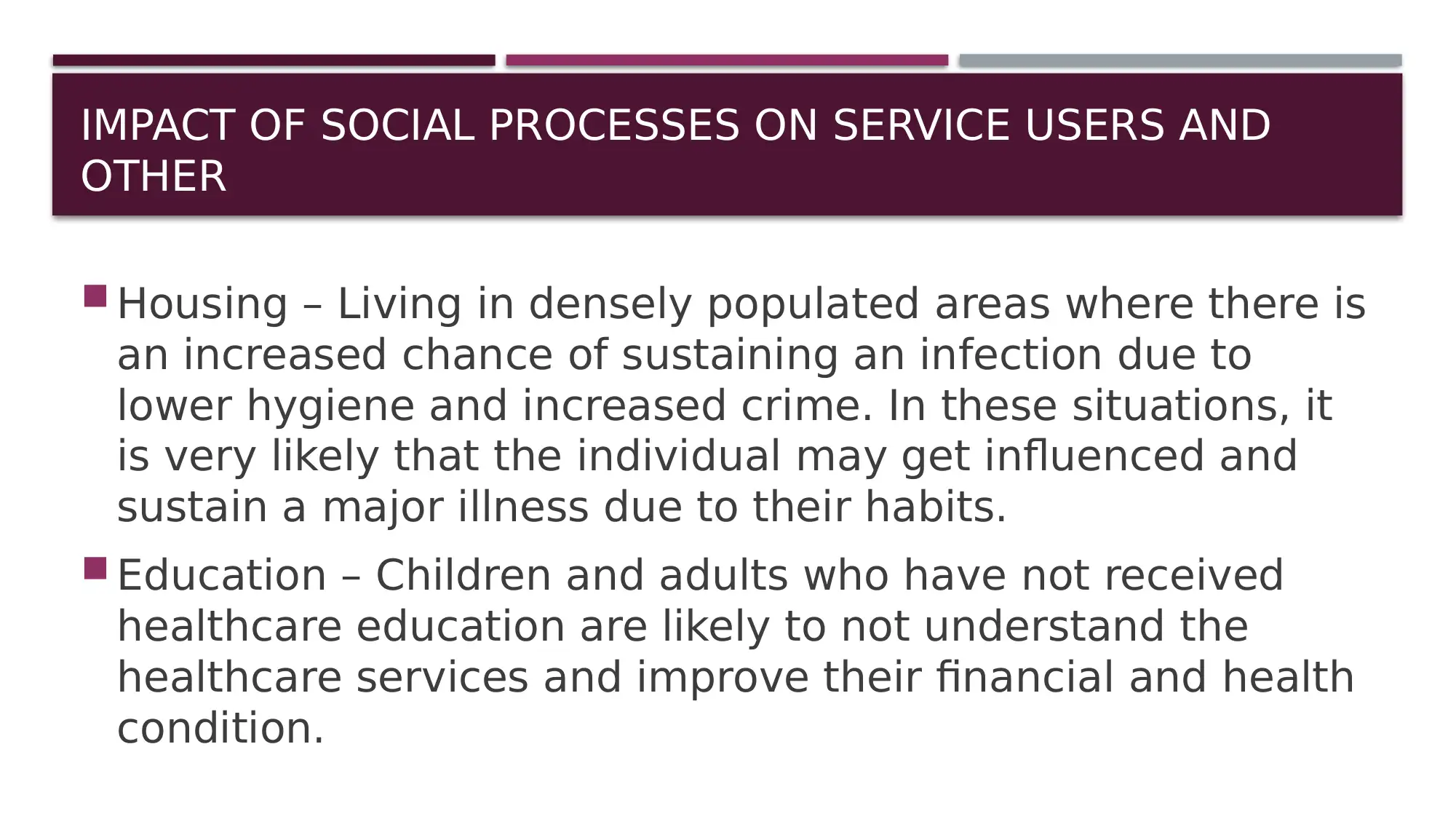
IMPACT OF SOCIAL PROCESSES ON SERVICE USERS AND
OTHER
Housing – Living in densely populated areas where there is
an increased chance of sustaining an infection due to
lower hygiene and increased crime. In these situations, it
is very likely that the individual may get influenced and
sustain a major illness due to their habits.
Education – Children and adults who have not received
healthcare education are likely to not understand the
healthcare services and improve their financial and health
condition.
OTHER
Housing – Living in densely populated areas where there is
an increased chance of sustaining an infection due to
lower hygiene and increased crime. In these situations, it
is very likely that the individual may get influenced and
sustain a major illness due to their habits.
Education – Children and adults who have not received
healthcare education are likely to not understand the
healthcare services and improve their financial and health
condition.
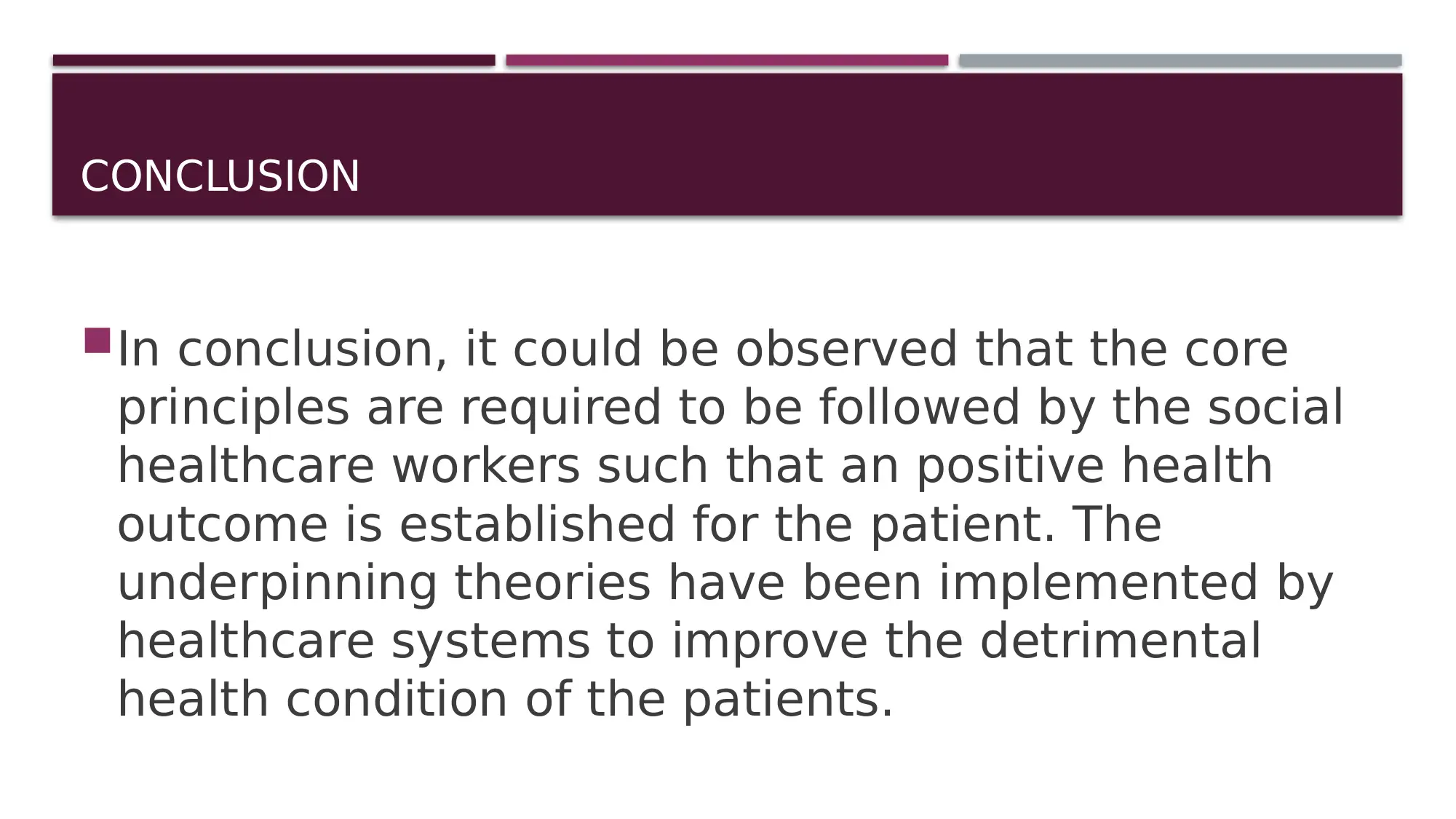
CONCLUSION
In conclusion, it could be observed that the core
principles are required to be followed by the social
healthcare workers such that an positive health
outcome is established for the patient. The
underpinning theories have been implemented by
healthcare systems to improve the detrimental
health condition of the patients.
In conclusion, it could be observed that the core
principles are required to be followed by the social
healthcare workers such that an positive health
outcome is established for the patient. The
underpinning theories have been implemented by
healthcare systems to improve the detrimental
health condition of the patients.
⊘ This is a preview!⊘
Do you want full access?
Subscribe today to unlock all pages.

Trusted by 1+ million students worldwide
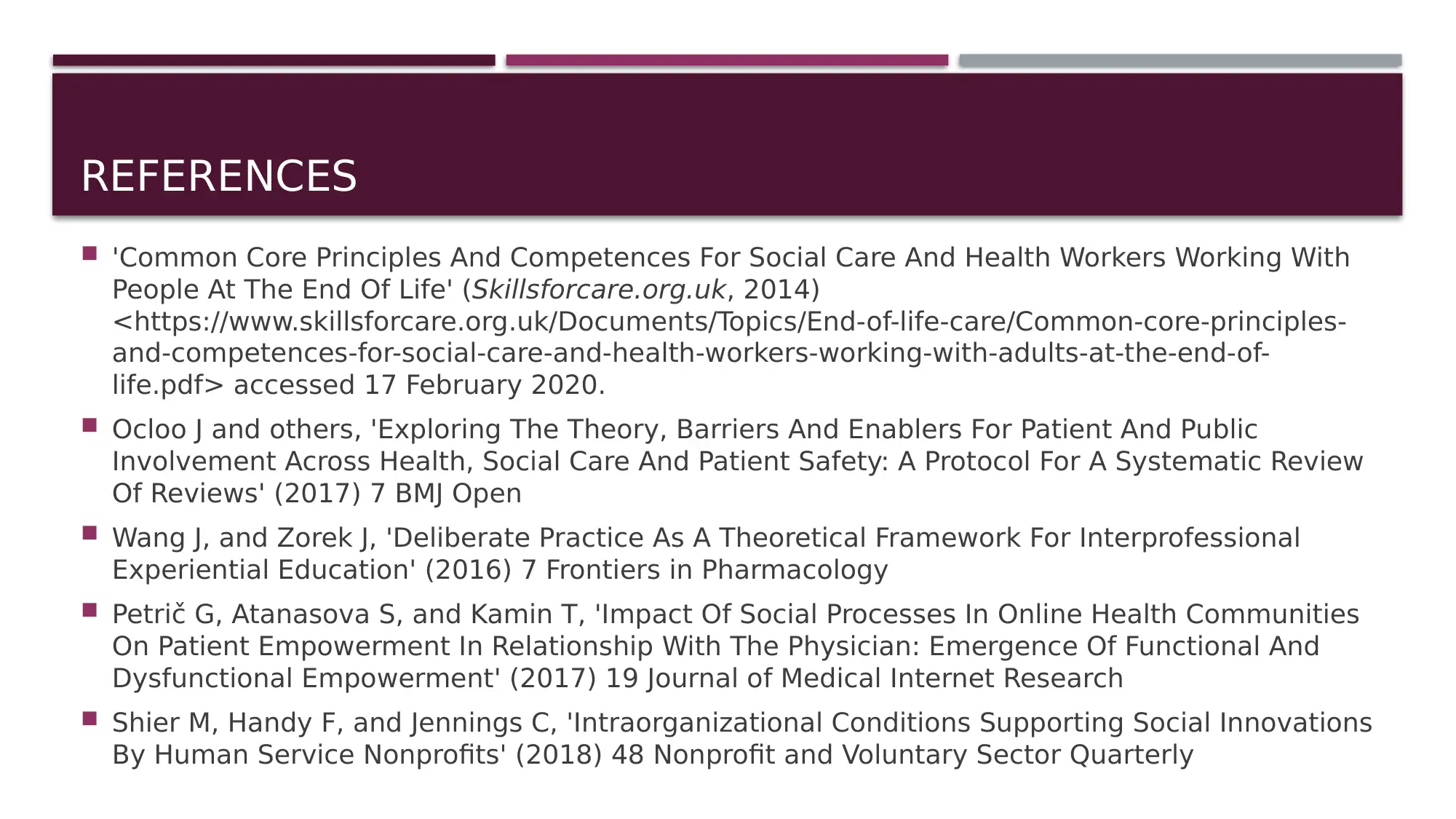
REFERENCES
'Common Core Principles And Competences For Social Care And Health Workers Working With
People At The End Of Life' (Skillsforcare.org.uk, 2014)
<https://www.skillsforcare.org.uk/Documents/Topics/End-of-life-care/Common-core-principles-
and-competences-for-social-care-and-health-workers-working-with-adults-at-the-end-of-
life.pdf> accessed 17 February 2020.
Ocloo J and others, 'Exploring The Theory, Barriers And Enablers For Patient And Public
Involvement Across Health, Social Care And Patient Safety: A Protocol For A Systematic Review
Of Reviews' (2017) 7 BMJ Open
Wang J, and Zorek J, 'Deliberate Practice As A Theoretical Framework For Interprofessional
Experiential Education' (2016) 7 Frontiers in Pharmacology
Petrič G, Atanasova S, and Kamin T, 'Impact Of Social Processes In Online Health Communities
On Patient Empowerment In Relationship With The Physician: Emergence Of Functional And
Dysfunctional Empowerment' (2017) 19 Journal of Medical Internet Research
Shier M, Handy F, and Jennings C, 'Intraorganizational Conditions Supporting Social Innovations
By Human Service Nonprofits' (2018) 48 Nonprofit and Voluntary Sector Quarterly
'Common Core Principles And Competences For Social Care And Health Workers Working With
People At The End Of Life' (Skillsforcare.org.uk, 2014)
<https://www.skillsforcare.org.uk/Documents/Topics/End-of-life-care/Common-core-principles-
and-competences-for-social-care-and-health-workers-working-with-adults-at-the-end-of-
life.pdf> accessed 17 February 2020.
Ocloo J and others, 'Exploring The Theory, Barriers And Enablers For Patient And Public
Involvement Across Health, Social Care And Patient Safety: A Protocol For A Systematic Review
Of Reviews' (2017) 7 BMJ Open
Wang J, and Zorek J, 'Deliberate Practice As A Theoretical Framework For Interprofessional
Experiential Education' (2016) 7 Frontiers in Pharmacology
Petrič G, Atanasova S, and Kamin T, 'Impact Of Social Processes In Online Health Communities
On Patient Empowerment In Relationship With The Physician: Emergence Of Functional And
Dysfunctional Empowerment' (2017) 19 Journal of Medical Internet Research
Shier M, Handy F, and Jennings C, 'Intraorganizational Conditions Supporting Social Innovations
By Human Service Nonprofits' (2018) 48 Nonprofit and Voluntary Sector Quarterly
1 out of 10
Related Documents
Your All-in-One AI-Powered Toolkit for Academic Success.
+13062052269
info@desklib.com
Available 24*7 on WhatsApp / Email
![[object Object]](/_next/static/media/star-bottom.7253800d.svg)
Unlock your academic potential
Copyright © 2020–2025 A2Z Services. All Rights Reserved. Developed and managed by ZUCOL.





